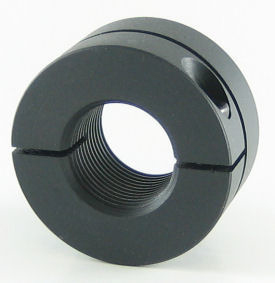SHAFT COLLARS

SHAFT COLLARS
Shaft collars are machine components featuring a simple design that consists of a round metal or plastic ring with a clamp screw and/or screws. Tightening the screws causes the ring to tighten or loosen around the shaft. When securely tightened, shaft collars can serve as mechanical stops or hold components in place along a shaft.
Despite their simple design, shaft collars play an important role in a wide range of industrial applications. As such, when choosing one for a particular application, it is essential to use the one with the right design and performance characteristics.
As an experienced manufacturer and distributor of shaft collars suitable for use in power transmission, motion control, automation, and other OEM and MRO operations, Stafford Manufacturing Corp. has the knowledge, skills, and inventory to help customers select and source the right shaft collar for their application. In addition to offering standard shaft collars, we also provide custom design and engineering services to manufacture specialized shaft collars for unique customer needs.
TYPES OF SHAFT COLLARS
Shaft collars provide three primary functions: 1) holding components in place, 2) locating or positioning components on a shaft, and 3) creating an attachment between shaft and another component. As they perform these functions in a wide variety of applications, manufacturers and distributors supply variations that differ in design, size, and material to suit a variety of uses. Some of the types commonly available include:
- Threaded shaft collars. Threaded shaft collars have a threaded interior that allows for use on threaded shafts, making them an excellent choice for heavy-load applications requiring high axial holding power. The threaded design also allows for easy adjustments and precise positioning.
- One-piece shaft collars. One-piece shaft collars feature a simple design featuring a single screw. They work by surrounding the shaft with an evenly distributed compressive force. Since they cannot be disassembled, one-piece collars are only suitable for applications where the end of the shaft is accessible.
- . Unlike one-piece shaft collars, two-piece shaft collars can be completely disassembled, allowing them to be used in situations where the end of the shaft is not accessible. Two-piece collars also provide greater holding force and shock-load resistance relative to their one-piece counterparts as they can use their full seating torque to provide compressive forces around the shaft.
- Hinge shaft collars. Similar to the design of two-piece shaft collars, the design of hinge shaft collars allows for easy disassembly and reassembly along the shaft. They consist of a single unit that can be installed without the risk of dropping loose parts. As they can be installed quickly, hinge shaft collars are often the collar of choice when operating under strict time constraints or in harsh environments.
- Heavy-duty shaft collars. Compared to other shaft collar designs, heavy-duty shaft collars feature larger clamping screws and greater outer diameters and widths. These qualities allow them to provide exceptional holding power. Increasing the outer diameter or width of the collar enables them to make use of the extra torque produced by bigger screws. The torsional holding capacity of heavy-duty collars is approximately twice that of standard collars.
- Shaft Collar Bore Varieties. Bore shaft collars are manufactured in round, threaded, hexagonal, and square configurations, each of which is described below:
- Round bore shaft collars are used as stops, locators, spacers, and bearing faces for a broad range of motion control, power transmission, and mounting applications. They are suitable for use on shafts, piping and tubing, and split hubs.
- Threaded bore shaft collars provide exceptional axial holding power without damaging threaded shafts. Their simple yet flexible design enables quick assembly and easy adjustments.
- Hexagonal shaft collars and square shaft collars are exclusively manufactured by Stafford Manufacturing to fit hexagonal or square shafts. These non-marring shaft collars are commonly used for agricultural applications or conveyor drive systems.
BENEFITS OF SHAFT COLLARS
When used in power transmission, motion control, automation, and other OEM and MRO applications, shaft collars offer several benefits, including:
- Easy installation. Shaft collars are designed for easy installation and removal. Many of them can be installed without removing other shaft component and/or used in situations where the end of the shaft is inaccessible.
- Broad versatility. Available in a wide range of designs and materials (e.g., corrosion-resistant and heavy-duty materials), shaft collars can be manufactured to withstand a variety of environmental and operating conditions, including exposure to chemicals, oils, and high temperatures.
- High customizability. Shaft collars have a wide range of sizes, styles, and material options available, allowing them to be tailored to suit virtually any application.
APPLICATIONS OF SHAFT COLLARS
Shaft collars find application in numerous industrial equipment and systems, including in the following:
- Automation machinery. For precise automation operations, shaft collars play a number of roles, including serving as positioning and aligning bearings, gears, pulleys, and other motion components.
- Trucks & Off-Road Vehicles. In trucks & off-road vehicles, shaft collars act as mechanical stops for cylinders, actuators, and other components.
- Laboratory equipment. In laboratory equipment such as clamps and frames, shaft collars serve as precise and easy-to-adjust stops and spacers. They can also be used on glass, plastic, and thin-wall tubing.
- Medical equipment. Shaft collars with precise face-to-bore mating characteristics satisfy the strict design requirements of medical equipment. They are used as guides, stops, and spacers in everything from adjustable hospital beds to the positioning systems of MRI and CT machines.
- Optical components. Shaft collars are often used in optical measuring instruments and components to facilitate precise positioning and fine-tuning capabilities.
- Power transmission components. In power transmission operations, shaft collars facilitate the positioning of motor and gearbox assembly components.